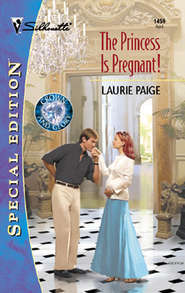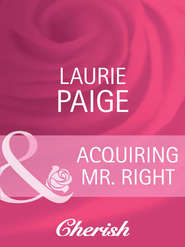По всем вопросам обращайтесь на: info@litportal.ru
(©) 2003-2024.
✖
Her Montana Man
Автор
Год написания книги
2018
Настройки чтения
Размер шрифта
Высота строк
Поля
With a deck built out at the edge of a tiny cove, the place was as enchanting as a scene in a fairy tale.
Grabbing her purse, which held her recorder and the notes dictated that morning, she went in and changed to shorts, a comfortable T-shirt and flip-flops. On the deck, with a tall glass of iced tea and her handy laptop computer, she began her formal report.
Sometime later, the sound of tires on the gravel lane interrupted her concentration. She heard a car door slam, then silence. She waited until a knock sounded on the cabin door before calling out, “I’m on the deck.”
A male figure appeared at the corner of the cabin. Dressed in jeans and a polo shirt, his stride long and assured, the visitor exuded power and authority.
She instantly recognized the sandy-blond hair and six-two frame of her long-ago lover. Pierce was a man with a commanding presence. She hadn’t been surprised when Kelly had told her Pierce was now mayor of the town.
The jagged edge of remembered hurt plucked at her heart, a never-forgotten melody of love and wonder and, ultimately, rejection. Pierce had made it clear he was not a settling-down kind of man the last time she’d seen him.
“Hello, Pierce,” she managed to say in a quiet manner.
Two years older than she was, at thirty-six he looked trim and fit, a prime male specimen with his blue eyes and handsome, somewhat rugged features. He’d always reminded her of the mountains—strong and solid and inspiring.
It had been eight years since she’d last seen him. They’d parted one stormy April night, two months before she graduated medical school. So many dreams ago.
He ignored the three steps and leaped to the deck in a single, graceful bound. “Chelsea,” he said, acknowledging her greeting. He didn’t smile.
So what had she expected—that he would gaze soulfully into her eyes and declare he’d never gotten over his love for her and that she must marry him at once so they could live happily ever after?
Dream on, she thought, and would have laughed had it been the least funny.
“You have a wonderful place over there,” she said, indicating the resort, the lake and the idyllic setting.
He nodded, his mind obviously not on the scenery. “What did you find out?”
Blunt and to the point. She’d wondered how he would react to her being here—on his turf, so to speak—so now she knew. She could be all business, too.
“I’m preparing a report for the deputy,” she told him with a polite smile. “He’ll have it Friday morning.”
“I want it now.”
She started to make a smart remark, but, seeing the concern in his eyes, she refrained. This was his hometown and he was the mayor. Murder was serious business.
“You’d better have a seat,” she advised. “Would you like a glass of iced tea?” She’d finished her own glass while working on the report.
Impatience flickered over his face and was gone. He nodded and settled in the deck chair facing the lake.
She quickly prepared the refreshing drinks, then, after a struggle with herself about playing the polite hostess, arranged a tray of crackers, cheese, veggies and dip and carried them outside.
“Thanks,” he said, taking the glass she indicated and pulling a table between their two chairs so she could set the tray down.
When she was seated, he leaned forward, his blue eyes focused intently on her. It would have been exciting, except she knew he was interested only in her information.
“The victim died of a gunshot wound to the head,” she told him. “The bullet entered the left temple and ricocheted in the skull without exiting, inflicting severe brain damage and instant death.”
“I can’t believe she’d commit suicide.”
Chelsea gave him a level perusal. “She didn’t.”
“She didn’t?” he echoed, his eyes hot blue lasers as he glared at her.
“She was semiconscious from a blow to the back of the head. Prior to that, she’d been slapped hard enough to leave a bruise. From scrapes on her elbow and knees, she probably fell to the floor. She was then placed in a chair and shot from a distance of three or four feet. Panicking, the perp decided he’d better make it look like suicide.”
“Why panic and why a he?”
Chelsea considered the evidence before replying. “The victim was hit hard enough to knock her unconscious or nearly so—”
“Harriet,” he broke in. “Her name was Harriet Martel.”
Chelsea kept a bland expression. She’d learned during her five years of pathology training and three years on the job to keep an emotional distance from those who’d died by violence; otherwise, her job would become unbearable.
“From the deputy sheriff’s report, Miss Martel was knocked to the floor, then lifted, not dragged, to the chair. Both facts indicate strength. If you’re looking for a female perp, she’s strong as an ox.”
He gave a grunt that could have indicated agreement, skepticism or any number of things. “Why did he panic?”
“His anger cooled after he killed her. He realized he needed to make it look like suicide and that someone might have heard the shot. He wanted to get away, so he was hasty in setting up the scene. He wiped the gun, then pressed her fingers into position around it.”
Pierce frowned at her. “The gun was found on the floor beside the chair.”
“Planted to look as if she dropped it after the shot.”
Chelsea watched a couple push off from a dock across the lake. Cabins nestled among the trees over there. Pierce had started from scratch and made a huge fortune in real estate and recreational activities for tourists, so his sister had said. Good for him.
“However,” she continued, pulling her gaze from the happy couple, whose laughter she could hear drifting over the water like an echo from happier times in her own past, “he messed up. Suicide victims usually retain the gun in a death grip that’s almost impossible to break.”
Pierce was quick on the uptake. “Usually?”
“Yes. That’s the first thing you look for in a suspected suicide. But it doesn’t always happen, so I examined the weapon. From the fingerprint evidence, Miss Martel didn’t exert enough force on the gun to pull the trigger, much less hold it in place to kill herself. There were no powder burns, either.”
“So the gun had to be held at least a few feet from her,” he murmured, frowning as he considered this fact.
Chelsea nodded and lifted her glass. The tea was cold and tart from the generous squeeze of lemon she’d put in. She hadn’t added any lemon to his glass on the assumption he still liked it with one spoon of sugar and no lemon.
Eight years was a long time, she reflected. Perhaps his tastes had changed. However, he didn’t say anything as he took a long drink, then rubbed at the condensation on the glass while he thought.
She continued with her conclusions about the crime. “I think the killer didn’t decide to shoot her until he placed her in the chair. They’d been quarreling. Perhaps she’d hit him first. Now she was vulnerable, in his power. He needed to get rid of her, to keep her quiet—”
“Why?” Pierce demanded.
Chelsea met his gaze. “The victim…Miss Martel…was pregnant. About four months, I would say.”
“She couldn’t have been,” he said. “She was an old maid, the town librarian, for Pete’s sake. She didn’t date anyone.”
“Maybe not,” Chelsea said coolly. “But she was certainly having an affair. I’d look for a married man with a lot to lose if the scandal got out, someone in a prominent position in town, maybe someone on the city council.”
“Yeah, right,” Pierce said in a snarl, rising to his feet and looming over her. “The council is composed of a retired rancher, a high school coach at least fifteen years younger than Harriet, plus three women. That’s certainly a bunch of likely suspects.”











